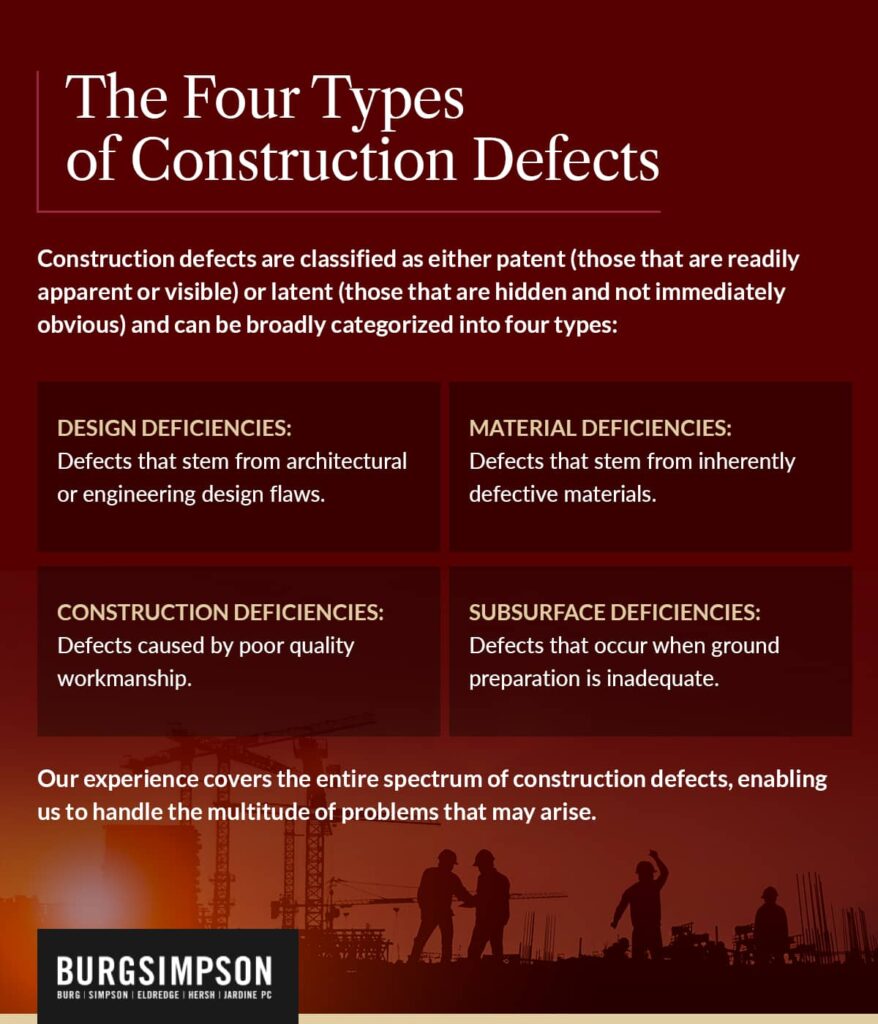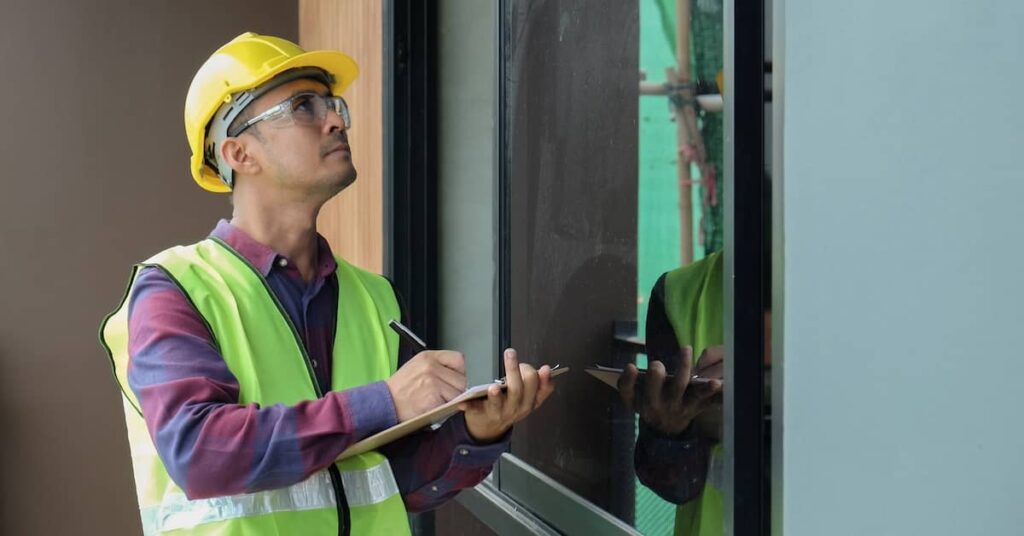Construction Defect Attorneys Serving Denver and All of Colorado
The Denver construction defect lawyers at Burg Simpson Law Firm understand how important it is for people to have a safe place to call their own. A dream for many, purchasing a home should be exciting and joyful, but this dream can quickly turn into a nightmare when issues surrounding the integrity of its construction arise.
Construction defects diminish the value of your home. They can also pose serious safety risks for its occupants. Compounding those issues, these defects often result in emotional distress as well, causing uncertainty about how to protect your investment and your family’s well-being.
Under the Colorado Construction Defect Action Reform Act (CDARA), homeowners have specific rights and protections when it comes to shoddy construction, poor materials, and faulty design. This Act outlines the procedures and requirements for homeowners seeking to file claims against builders and developers, but can be confusing to those unfamiliar with construction law.

With over four decades of proven experience, the Denver construction defect attorneys at Burg Simpson Law Firm have a strong understanding of the CDARA. We are here to listen to your story, provide straightforward advice, and help you determine how best to protect your investment and proceed with your claim.
If you are dealing with construction defects in Denver or a surrounding area of Colorado, call Burg Simpson at 303-792-5595 today to schedule a FREE and confidential consultation. We proudly assist homeowners dealing with these complicated cases throughout the state.
In addition to representing homeowners, Burg Simpson assists commercial property owners in Colorado with construction defect claims. Visit our Commercial Property Construction Defect page for additional information.
What Are Construction Defects?
In Colorado, a construction defect can include any defect in design or construction that results in damages to or the loss of use of a property. A defect can also include design and construction issues that lead to personal injury.
While this sounds straightforward, it is often very difficult to reach a consensus on what constitutes a construction defect. Identifying and proving a defect exists requires a deep understanding of the complex interplay between the legal, architectural, and engineering issues involved in the building trades.
Construction defects can be broadly categorized into four types:
- Design Deficiencies: These defects stem from architectural or engineering design flaws. Examples include inadequate structural support leading to sagging floors or roofs, and improper drainage design allowing for water penetration.
- Material Deficiencies: Sometimes the materials used in construction are inherently defective. This could include sub-standard windows that lead to water leaks, or faulty drywall that allows mold to grow.
- Construction Deficiencies: These are defects due to poor quality workmanship. Examples include poorly sealed seams, subpar carpentry, and improperly installed roofing.
- Subsurface Deficiencies: Particularly relevant in Colorado’s varied landscape, these defects occur when ground preparation is inadequate. This can lead to shifting homes, cracked foundations, and other structural issues.
Within these categories, defects can be classified as either patent or latent. Patent defects are those that are readily apparent or visible to the naked eye, including cosmetic issues like poorly painted surfaces or more serious concerns such as exposed wiring. Latent defects, on the other hand, are hidden and not immediately obvious. These could be serious structural issues like faulty electrical wiring behind walls or substandard plumbing that only becomes evident over time.
The scope of construction defects can vary significantly. Some, like incorrect paint colors or improperly installed fixtures, might be largely aesthetic but still impact the overall value and enjoyment of the property. Others, like foundation problems or inadequate electrical systems, pose serious safety risks and can lead to extensive financial loss, serious injury, or even death.
For over 40 years, our Denver construction defect lawyers have been advocating for homeowners and homeowner associations facing patent and latent defects. Our experience covers the entire spectrum of construction defects, enabling us to handle the multitude of problems that may arise. Whether dealing with a minor aesthetic issue or a significant structural flaw, we have the knowledge and experience necessary to protect your rights and your property—and to ensure that your home is safe, secure, and reflective of the investment you have made.
Who Can Be Held Liable for Construction Defects?
The complexity of construction projects means that multiple parties might be liable for defects. The nature of the defect—along with the contracts and agreements involved in building homes—will influence where liability falls. Having an experienced construction defect attorney on your side is essential for ensuring all liable parties are held accountable.
The range of potential liable parties in construction defect cases in Colorado includes:
- General Contractors
- Subcontractors
- Builders and Developers
- Architects and Engineers
- Material Suppliers and Manufacturers
Determining liability in construction defect cases often hinges on the contractual relationships between these parties. For instance, a general contractor might be liable for defects caused by a subcontractor if their contract stipulated oversight responsibility for all aspects of construction. Similarly, a developer might be held liable if it can be shown that they exerted significant control over the construction process or made critical decisions that led to the defect.
The Role of Warranties and Representations
Warranties and representations made by builders, contractors, or suppliers can also play a role in establishing liability. Express warranties, stating that materials or workmanship will meet certain standards, can be a basis for claims if defects arise. Similarly, implied warranties, such as the implied warranty of habitability, can also be grounds for holding parties liable.
At Burg Simpson Law Firm, our Denver construction defect lawyers understand the complexities of establishing liability. We thoroughly analyze contracts, warranties, and the roles of various parties in the construction process to identify and hold accountable those responsible for defects. During your cost- and obligation-free consultation, we will review your claim to help you understand how best to proceed with your case.
A Note on the Rights of HOAs
Our attorneys have represented thousands of condominium, townhome, and homeowners associations across Colorado seeking damages for residential construction defects, such as:
- Soil and slope instability and geologic hazard problems
- Real and artificial stucco failure
- Water intrusion and building envelope failures
- Roof failures
- Underground drain failures
- Design errors
- Poor workmanship
- Building material and product failures
- Roadway problems
- Construction material and building product failures
- Failing roads and infrastructure
Our Denver construction defect lawyers are here to help HOA boards find experienced construction professionals to evaluate problems and make necessary repairs—and to hold the builders and developers responsible for those defects to full account, legally and financially.
What Is the Statute of Limitations for Construction Defect Claims in Colorado?
Colorado courts and lawmakers have been wrestling with the finer points of construction defects law for decades. One of the biggest changes over the last several years has been an orchestrated effort to scale back homeowners’ rights. The most dramatic of which has been to slash the statute of limitations to two years (see Colo. Rev. Stat. § 13-80-104). The clock starts ticking “after the claim for relief arises,” which is defined as when a homeowner discovers (or should have discovered) a construction defect.
Two years is not a lot of time. While some issues may seem minor, waiting can result in an inability to take action against the liable party. If you have noticed a construction defect, reach out to our Denver office immediately to schedule a FREE case review and help ensure your rights are protected.

How Burg Simpson Law Firm Can Help
Burg Simpson, a nationally recognized personal injury law firm, has been serving Colorado for over 40 years. With more than $2 billion recovered in verdicts and settlements for our clients, we bring a wealth of experience and resources to your construction defect claim.
Our approach is holistic and client-centered. We understand the emotional and financial toll construction defects can have on homeowners. Our Denver team, with more than 25 personal injury lawyers, has the background, experience, resources, and tenacity to navigate even the most complex of these claims. We are here to stand by your side throughout the entire legal process.
Our firm’s reputation for excellence is backed by numerous awards and accolades, including recognition as one of America’s 25 Most Influential Law Firms. When you choose Burg Simpson, you are choosing a law firm that truly takes your case personally and is fully committed to helping you get the justice you deserve.
Contact Our Denver Construction Defect Lawyers for a FREE Consultation
If you have suffered damages due to a construction defect, Burg Simpson Law Firm is here to help. Contact us online or call us at 303-792-5595 today to schedule your FREE consultation and learn more about your rights. Our construction defect lawyers serve all of Colorado from our offices in Denver.





